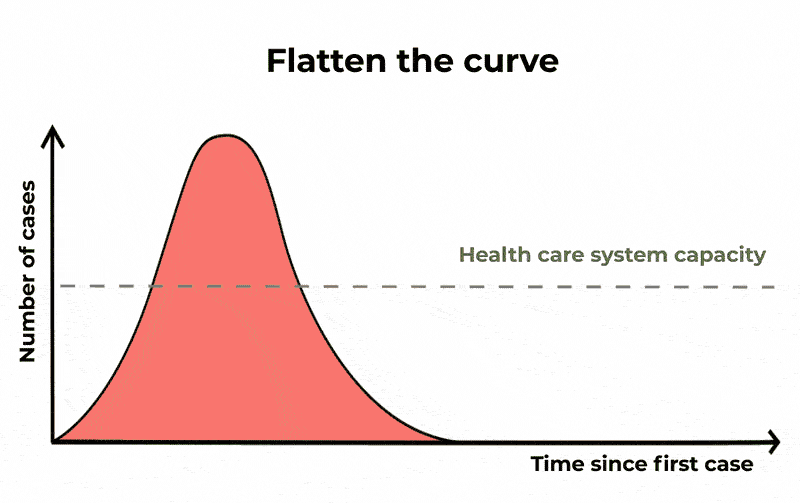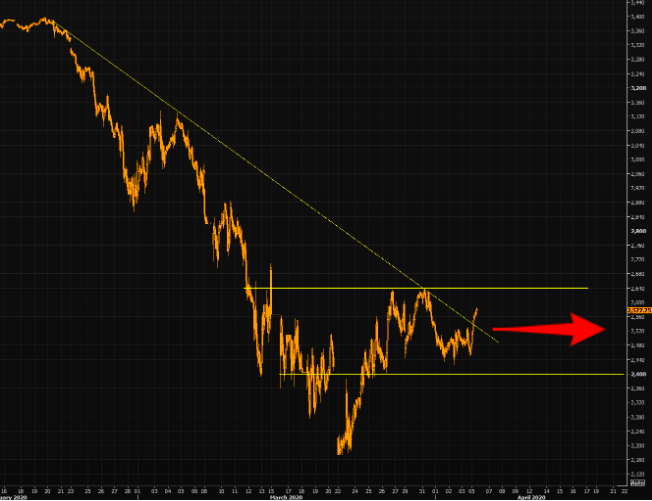The market has not really moved anywhere since early March
Given the mitigation being done, indeed, no single first world country will see millions of death (the playbook is known now, if populations comply they’ll avoid most of it, tho we don’t know yet how to get out of it until treatment or vaccine is widely available).
But the worldwide number will likely be in millions (US is projected at 100k), and the most worrying will be the impact on the developing world, where stopping the economy might be not feasible (I don’t know if you’ve seen the news from e.g. Equator, and lots of other countries might end up in the same place).
I find these lines fun.
You could probably give a child a pen and a ruler and would get a result that has the same explanation power.
Fear maybe yes. People are not ignorant any more and are adhering to measures.
Yet Africa is just starting to “be afraid” these days…
(Economic) consequences most likely no.
Remember the article on Italy which stated that many deaths (e.g. in nursery homes) are not reported as being corona-related/caused?
Not sure how much has that approach changed, and if it was only in Italy…
Meanwhile in BoA forecasts…
Me too. Here’s my prediction for the market:

It’s a damn price chart. What’s fun about it? It shows exactly what I said it does. Markets did not really move since early March. It shows the past, has no predictive power.
But the risk of payment default is still real…
Argentina plans payment freeze on up to $10 billion in local-law dollar debt
People tend to not read what is written but what they like to read. However, you put an arrow there, which clearly is a sign of prediction. So maybe take their feedback an reflect on how you communicate your message, what matters is how it is perceived and not what you think people will understand. Also, images are also always stronger than words…
Only 552 new cases yesterday. I’m optimistic now that this will be over by the end of this month.
What will? The current surge or mitigation measures? (I’m still not sure what the government plan is, contact tracing once we’re around 0 new cases?)

Well there won’t be ever 0 new cases. This virus will probably infect 70% of humanity. We just have to make sure that there aren’t too many cases at the same time.
I thought we had agreed that tracking the number of active/new cases doesn’t help much, as not everyone is tested and tracked properly…
But I hope the “trend” persists (that is if they are maintaining the same approaches with testing etc. - as in if the standard error / “noise” is more or less the same ![]() - and the numbers are indeed slowing).
- and the numbers are indeed slowing).
And no, I see no way that everyone will get a “free pass” by end of this month, because without the vaccine or herd immunity (far from both), we would just have another breakout.
What I can imagine however, is that in a couple weeks they try to experiment with relieving the measures gradually to kickstart the economy - by canton / company / whatever - to see what the impact is and if the health systems can sustain it.
That would likely take years to infect 70% of the population without overwhelming the healthcare system, vaccine are likely available before reaching natural immunity (and thankfully fatalities will be lower).
I’m not aware of any country where that’s the plan (UK considered it at some point, maybe Sweden still does?).
What I could imagine is relaxing the measures according to how easy is it is to maintain social distancing. For example, all shops could open again, like in Austria, from May (maybe with the requirement to wear masks), all hairdressers, cosmetic salons etc could as well (certainly with requirement to wear masks, at least the employees, if not the customers). Restaurants and bars if distance of 2m can be maintained. Festivals, busy events etc. would not yet be possible, because it’s near impossible to maintain the necessary distance.
I went for a walk and saw this sign for the first time (not my picture, I wasn’t at Paradeplatz)
On my walk I saw quite a lot of people. Many of these people did not care to keep distance from me, I had to walk around them. If people behave like this and don’t stay home (like I didn’t) then I have a feeling we could still have a curfew. If, with the current measures, the new cases keep coming at 1000 per day, then it will be the only way to really kill the spread of the virus.
I really believe that herd immunity is our only exit door of this mess. (Yes, it is a belief and I do not have any proof so far) These people are just working toward this goal. Stay at home and leave others taking the risk of getting the immunity (and the virus).
At least the people who work from home have a choice how often they go get the groceries or some fresh air. But what about the supermarket, healthcare workers?
Btw my mom has heart problems, I think covid-19 would be a serious threat to her life, but so far she is not allowed to work from home, even though she totally could. That’s Poland though. I don’t get why they didn’t yet order people to work from home if they can.
The two problems I see with the herd immunity approach are that we don’t know how many are actually infected and thus how far we are from herd immunity and how long it takes to get there.
If actually 10x more people are infected than have been tested positively, then at the moment only about 2% of the Swiss population are immune. For herd immunity you need more than 60%, if I recall correctly, so 30 times more. It will be difficult if not impossible to go from 2% to 60% fast enough without overwhelming the health care system with people for whom becoming immune didn’t work out so well.
That map of Germany could as well be a population density map.
AFAIK, there is also not yet certainty that getting the virus makes you immune, is there? Definitely not certainty that you’d be immune next year. And I guess the more people get it, the more likely it is to mutate.

